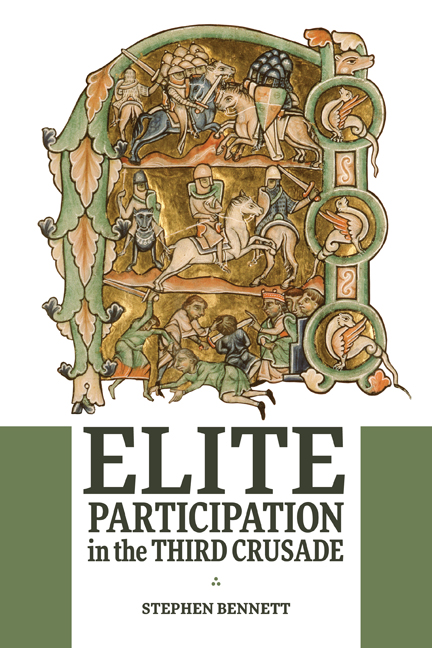Book contents
- Frontmatter
- Contents
- List of Illustrations
- Preface and Acknowledgements
- List of Abbreviations
- Notes on Sources, Names, and Coinage
- Map
- Introduction
- 1 Faith and Finance: Religious Foundations, Ecclesiastical Leaders, and Fraternity
- 2 Family and Heritage: Lineage, Kinship, and Tradition
- 3 Locality and Fellowship: Territory, Trade, and Tournaments
- 4 The Household of King Richard I at the Time of the Third Crusade
- Conclusion: Personal, Spiritual, and Communal Influences on Participation in the Third Crusade
- Appendices
- Bibliography
- Index
- Warfare in History
4 - The Household of King Richard I at the Time of the Third Crusade
Published online by Cambridge University Press: 09 February 2021
- Frontmatter
- Contents
- List of Illustrations
- Preface and Acknowledgements
- List of Abbreviations
- Notes on Sources, Names, and Coinage
- Map
- Introduction
- 1 Faith and Finance: Religious Foundations, Ecclesiastical Leaders, and Fraternity
- 2 Family and Heritage: Lineage, Kinship, and Tradition
- 3 Locality and Fellowship: Territory, Trade, and Tournaments
- 4 The Household of King Richard I at the Time of the Third Crusade
- Conclusion: Personal, Spiritual, and Communal Influences on Participation in the Third Crusade
- Appendices
- Bibliography
- Index
- Warfare in History
Summary
For if we do not take the Cross, we shall lose the king; and if we do take the Cross we shall lose God, because we shall not be take the Cross for him, but fear of the king.
John of Joinville, ‘La Vie de saint Louis’, c.1309In November 1187 Richard, count of Poitou, took the cross at Tours Cathedral. By mid 1190 he had been crowned king of England and had departed on the Third Crusade, only returning some four years later following his release from captivity in Germany. This case study revisits the question of how Richard succeeded in attracting members of the nobility to his crusading contingent whilst ensuring the stability of his realm. In analysing the functions and roles of members of King Richard's military household during the Third Crusade, it offers deeper insights into how medieval armies were commanded in battle, especially crusader armies. It also presents a new perspective on Richard's approach to loyalty, homage, and reciprocity, which is more in line with the pragmatism of L’Histoire de Guillaume le Marechal than more romantic depictions of allegiance.
Historians have accused Richard of inept governance of the Angevin realm and lack of interest in English affairs. Norgate portrayed him as ‘totally destitute of his father's business capabilities’ and Stubbs dismissed him as ‘a bad son, a bad husband, a selfish ruler and a vicious man’. In general, however, this does not match his depiction in contemporary chronicles, and recent research has done much to rehabilitate Richard's reputation.
In many ways, Richard was in a unique situation. He ascended the throne of England having previously taken the Cross and, despite threats to his position – both internal and from beyond the borders of his realm – he remained committed to fulfilling his vow to regain the True Cross and recover Jerusalem. Notwithstanding his father's preparations, that he was able to mount a major expedition to the other side of Europe less than twelve months after becoming king of England was a considerable achievement. Moreover, he sought to establish a robust structure of governance prior to departing on crusade, ensuring that contingencies were in place to deal with potential threats, notably that from his younger brother, John, as well as from King Philip II of France.
- Type
- Chapter
- Information
- Elite Participation in the Third Crusade , pp. 159 - 212Publisher: Boydell & BrewerPrint publication year: 2021



